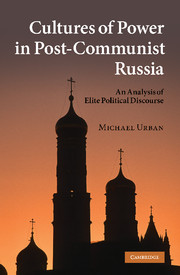5 - Competence
Published online by Cambridge University Press: 07 September 2010
Summary
In any activity it is necessary to be a professional (B9).
The words “professional” and “professionalism” enjoy an almost magical ring in Russian political parlance. They are often intoned as a panacea setting right any number of enumerated ills. They connote a mastery of affairs and thus are sought-for things commonly regarded to be woefully absent in the world of practical endeavors. “Professional” thus contributes to political discourse the quality of competence. However, it also admits to quite different definitions in the Russian context, sometimes opposing the idea of politics, sometimes coinciding with it. This polysemic quality of “professional” appears to be of critical import for drawing divisions and constructing group identities in the world of politics. This chapter seeks to determine how the word “professional” has been used by past and present members of Russia's political class and outlines two opposing narrative programs that constitute its meanings. It also has a secondary objective: viz., to frame the results reported, here, within the scope of a dynamic model of change in Soviet, and now Russian, political communication. Because these objectives are analytically distinct, I return to the second one only in conclusion.
DISCOURSES OF PROFESSIONALISM AND POLITICS
In all, some twenty-one of the thirty-four members of the sample used “professional(ism)” during interviews. In twelve instances, it was self-referential, connoting their membership in some profession outside of politics. Accordingly, this group is a subset of what can be called “professionals in politics.
- Type
- Chapter
- Information
- Cultures of Power in Post-Communist RussiaAn Analysis of Elite Political Discourse, pp. 117 - 146Publisher: Cambridge University PressPrint publication year: 2010



